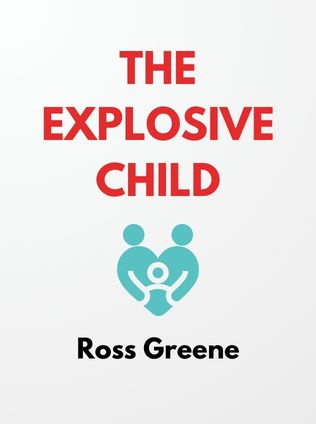
The Explosive Child
A New Approach For Understanding And Parenting Easily Frustrated, Chronically Inflexible Children
By Ross Greene
Published 10/1998
About the Author
Ross W. Greene, Ph.D., is a clinical child psychologist renowned for his work with children exhibiting behavioral challenges, particularly those who are often described as "explosive." He has dedicated his career to understanding the root causes of these behaviors and developing strategies to help children and their families manage and overcome them. Greene is the originator of the Collaborative & Proactive Solutions (CPS) model, which is the foundation of his book, The Explosive Child. His work is grounded in the belief that children do well if they can and that challenging behaviors are often the result of unmet needs or a lack of skills, rather than intentional disobedience.
In addition to his clinical work, Greene is a prominent speaker, educator, and advocate for children’s mental health. He has taught at Harvard Medical School, served as a consultant to numerous organizations, and founded the non-profit organization Lives in the Balance, which aims to promote the CPS model and support families dealing with behavioral challenges. Greene's approach is widely respected for its emphasis on empathy, collaboration, and skill-building, offering a compassionate alternative to traditional disciplinary methods.
Main Idea
The Explosive Child is a groundbreaking book that challenges conventional approaches to dealing with children who have frequent and intense behavioral outbursts. Greene argues that traditional methods, such as punishment and rewards, often fail to address the underlying issues that cause these outbursts. Instead, he proposes a collaborative, problem-solving approach that involves understanding the child's perspective, identifying the specific challenges they face, and working together to develop solutions. The main idea of the book is that explosive behavior is not a matter of choice but a symptom of unmet needs or lacking skills, particularly executive functions like emotional regulation, flexibility, and problem-solving.
The book offers practical strategies for parents, educators, and caregivers to help children develop these skills and reduce the frequency and intensity of outbursts. By fostering a collaborative relationship with the child, Greene believes that parents can create a more supportive and effective environment for growth and development, ultimately leading to better outcomes for both the child and the family as a whole.
Table of Contents
- Introduction: Understanding Explosive Children
- Chapter 1: Why Traditional Approaches Fail
- Chapter 2: A New Way to Think About Explosive Behavior
- Chapter 3: The Collaborative Problem-Solving Approach
- Chapter 4: Understanding Your Child's Triggers
- Chapter 5: Developing the Skills Your Child Needs
- Chapter 6: Preventing Outbursts Before They Happen
- Chapter 7: Overcoming Challenges in Implementing the CPS Model
- Chapter 8: Success Stories and Case Studies
- Conclusion: Moving Forward with Confidence
Introduction: Understanding Explosive Children
Greene begins by challenging the conventional wisdom that explosive behavior in children is a result of willful disobedience or a lack of discipline. He argues that these behaviors are more often the result of unmet needs or lacking skills, particularly in the areas of emotional regulation, flexibility, and problem-solving. Greene introduces the concept of "lagging skills and unsolved problems", which forms the foundation of his approach.
Children, according to Greene, do well if they can. If they are not doing well, it is because something is standing in their way. This perspective shifts the focus from blaming the child for their behavior to understanding what is preventing them from behaving in the way that is expected. Greene emphasizes the importance of empathy and understanding in this process, suggesting that parents and caregivers must first seek to understand the child's perspective before attempting to address the behavior.
Sign up for FREE and get access to 1,400+ books summaries.
You May Also Like
The Subtle Art of Not Giving a F*ck
A Counterintuitive Approach to Living a Good Life
By Mark MansonRich Dad Poor Dad
What the Rich Teach Their Kids About Money - That the Poor and Middle Class Do Not!
By Robert T. KiyosakiHow To Win Friends and Influence People
The All-Time Classic Manual Of People Skills
By Dale CarnegieFreakonomics
A Rogue Economist Explores the Hidden Side of Everything
By Steven D. Levitt and Stephen J. Dubner



















